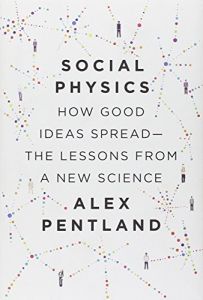Join getAbstract to access the summary!

Join getAbstract to access the summary!
Alex Pentland
Social Physics
How Good Ideas Spread – The Lessons from a New Science
Penguin, 2014
What's inside?
Older social science and economics models can’t describe the networked world. Social physics does.
Recommendation
Professor Alex Pentland of MIT presents a systematically revolutionary thesis and proposes a new field of study, “social physics.” He urges you to adjust how you think about ideas, personal connections, group interactions, cities, the economy and society. He argues that existing social science and economic models don’t work and advocates the science of social physics, which uses math to examine how “information and idea flow” shape behavior. He builds his argument with clear examples of the nature and value of social physics. Pentland’s persuasive, smooth text is rich with data because his social physics construct depends on big data for its insights. Applying his ideas won’t be easy, but he promises ample societal rewards: creativity, productivity and social efficiency. getAbstract recommends his thoughtful presentation to those interested in social sciences, organizational culture, data analysis, urban planning, networks and the digital world.
Summary
About the Author
Alex Pentland, PhD, is the Toshiba Professor at MIT, where he helped create the Media Lab, directs the Human Dynamics Lab, and co-leads the World Economic Forum Big Data and Personal Data initiatives. He is also the author of Honest Signals.


















Comment on this summary